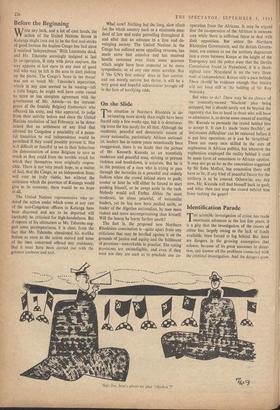On the Slide
ne situation in Northern Rhodesia is de- teriorating more slowly than might have been feared only a few weeks ago, but it is deteriorat- ing none the less surely for all that. Although the moderate, peaceful and democratic nature of many nationalist, particularly African national- ist, leaders has in recent years occasionally been exaggerated, there is no doubt that the picture of Mr. Kenneth Kaunda as an essentially moderate and peaceful man, striving to prevent violence and breakdown, is accurate. But he is in the position of a man who is trying to pass through the turnstiles in a peaceful and orderly fashion when the crowd behind starts to push; sooner or later he will either be forced to start pushing himself, or be swept aside in the rush. Nobody would call Ferhat Abbas the most moderate, let alone peaceful, of nationalist leaders, yet he has now been pushed aside, as leader of the Algerian nationalists, by men more violent and more uncompromising than himself. Will the lesson be learnt farther south?
The fact is, the proposed new Northern Rhodesian constitution is—quite apart from any criticisms that may be levelled against it on the grounds of justice and equity and the fulfilment of promises—unworkable in practice. The voting provisions are unintelligible, and even if they were not they are such as to preclude any co- operation from the Africans. It may be argued that the co-operation of the Africans is unneces- sary while there is sufficient force to deal with their opposition. But unless the Northern Rhodesian Government, and the British Govern- ment, arc content to see the territory degenerate into a cross between Kenya at the height of the Emergency and the police state that the Devlin Commission found in Nyasaland, it is a short- sighted view. Nyasaland is on the very thres- hold of independence; Kenya only a pace behind. There should be evidence enough that history will not keep still at the bidding of Sir Roy Welensky.
But what to do? (here may be no chance of the ironically-named 'Macleod' plan being scrapped, but it should surely not be beyond the ingenuity that lies to hand in those who will have to administer it, to devise some means of enabling Mr. Kaunda to persuade the crowd behind him to accept it. It can t2. made 'more flexible; or 'unforeseen difficulties' can be removed before it is put into operation; or it can be 'simplified.' There are many men skilled in the uses of euphemism in African politics, but whatever the euphemism employed the reality behind it must be some form of concession to African opinion. It may not go as far as the concessions suggested by Sir John Moffatt, but concession there will have to be, if any kind of peaceful future for the territory is to be assured. Otherwise, any day now, Mr. Kaunda will find himself back in gaol; and what then can stop the crowd behind him from rushing the gates?


































 Previous page
Previous page